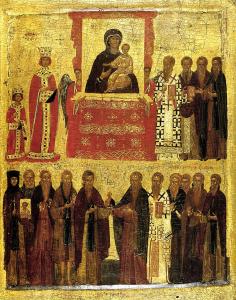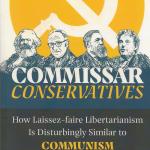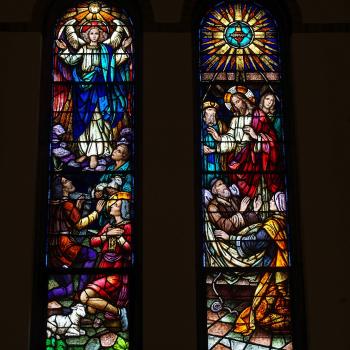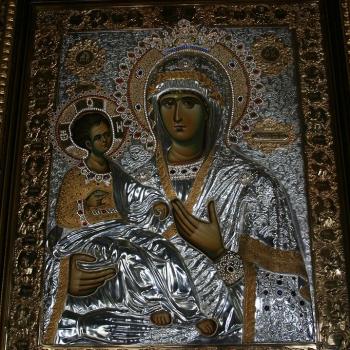
Orthodoxy without orthopraxis is not true orthodoxy. We are expected to live out our faith. This doesn’t mean we should merely stop doing all those things which we are told we are not to do, all the “thou shalt nots,” but also, and especially, we should embrace the positive content of our faith and what it encourages us to do. For, if we believe, then we will live out our lives doing the good which it tells us about. Hopefully by doing such good, not only will our lives be enriched, we will become better persons.
This is especially emphasized in the Byzantine calendar for the Great Fast. The first Sunday of the Great Fast is the Sunday of Orthodoxy – a Sunday which is not only about teaching the right things, but the way those right things are to be put in practice. This is highlighted by the way the Sunday commemorates the political and theological “triumph” of iconophiles, those who embrace the rightful use of icons and other images, over the iconoclasts, those who tried to put a stop to the use of icons and who actually destroyed countless ancient icons when they held power in Byzantium.
Icons represent a way in which the incarnation changed everything. God, who, by nature, cannot be imagined, and so cannot be depicted by images or statues, comes to us in a form which can be depicted. God became human, and indeed, a particular one, Jesus Christ. Jesus has a form which we can see and so an image which we can reproduce. God has given us a way to depict that which otherwise could not be depictable. Everything has changed, and so we, too should change and embrace that change through our actions. This is what the proper use and engagement of icons represents. Previously, humanity was told not to create images of heavenly things in order to remind us of the transcendent, incomprehensible nature of God; but now that God has become incarnate, now that God is also immanent with creation, we can use them because God has made a way for us to use them. And, indeed, when we use them, should understand that the nature of God has not changed, but the nature of our way of engaging God has. Our use of icons, using them as a means to engage the divine nature, and all that is connected with it, represents the way orthodoxy leads to practice, and if we truly believe in the orthodoxy teachings of the faith, we will act upon them. And, so, though the Sunday commemorates orthodoxy by remembering the way icons were defended and brought back into general use, it should remind us that orthodoxy in general should motivate us and help us do what is good, which is why it works well as a theme at the start of the Great Fast.
“By faith Moses, when he was grown up, refused to be called the son of Pharaoh’s daughter, choosing rather to share ill-treatment with the people of God than to enjoy the fleeting pleasures of sin” (Heb 11:24-5 RSV). Moses’s faith led him to be in solidarity with his people. He could have stayed with the rich and powerful. He could have been one of them. He already was treated as such. He would have had a life of pleasure, though it would have come at a cost, as he would have known his blood-relations, his family, suffered at the expense of his pleasure. And so he denied himself in order to help his family, his kin, and all his people; he raised them up as he lowed himself. It was what he needed to do in order to be with them so he could free them from the slavery they were under. Those who have a similar faith will act likewise; they will look to those who are outcasts in society, those who are unjustly mistreated and abused, and will do what they can to help them. They will not be able to be happy as they are so long as others suffer grave injustices. Like Moses, they will deny themselves so as to help those in need; they will confront the system, and the structures of sin, which keep the abuses in place, demanding that everything be changed. And they know, if they are to put their heart into it, that means they will often find themselves denying themselves various transitory pleasures so that they will be free to work for the greater good. “He considered abuse suffered for the Christ greater wealth than the treasures of Egypt, for he looked to the reward” (Heb. 11:26 RSV). We, likewise, should then do similar; we should deny ourselves, as the Great Fast suggests, so we can then deny the systemic structures of sin which keep too many down; if it means we suffer, we will do so, not because we think suffering is good, but because we look to our goal, one which includes an end to all needless suffering.
We, then, should understand what orthodoxy teaches us concerning our praxis. We should be interested in the well-being of others. We not only have Moses serve as an example, we have a great number of saints with him, and of course, we have our prime example, Jesus himself. For Jesus kenotically emptied himself of his divine glory to take on human nature and become one of us; he denied himself so that the world and all that is within it could be lifted up out of the net of sin. He made sure those who were adversely affected by sin could be healed and make greater.
This, then, is what is expected of us. We are to “pick up our cross” and follow Christ. We are to give of our ourselves as Moses gave of himself. We are to do so, however, in union with Christ, working with him and his own mission, that is, bringing salvation to the world, salvation which is not meant to be merely spiritual and have no real-world effects, but salvation which comes into the world and frees people from all the structures of sin which keep people down. “Therefore, since we are surrounded by so great a cloud of witnesses, let us also lay aside every weight, and sin which clings so closely, and let us run with perseverance the race that is set before us, looking to Jesus the pioneer and perfecter of our faith, who for the joy that was set before him endured the cross, despising the shame, and is seated at the right hand of the throne of God” (Heb. 12:1-2 RSV). Jesus denied himself so he could put himself in solidarity with all those who suffered under the “mystical Pharoah. ,” He did this so that he could take a hold of them in his love and lift them up with him when he was raised from the dead and ascended to the right hand of the Father. We are to do similar. We should give of ourselves, in full faith, in full love, to others, joining in solidarity with them, but especially with the outcasts, the abused, those who are poor and in need of help, helping them as we can, so that after all the shame we endure for their sake, we find we have also done it for the sake of God who not only will honor them, but will honor us with them.
Stay in touch! Like A Little Bit of Nothing on Facebook.
If you liked what you read, please consider sharing it with your friends and family!
N.B.: While I read comments to moderate them, I rarely respond to them. If I don’t respond to your comment directly, don’t assume I am unthankful for it. I appreciate it. But I want readers to feel free to ask questions, and hopefully, dialogue with each other. I have shared what I wanted to say, though some responses will get a brief reply by me, or, if I find it interesting and something I can engage fully, as the foundation for another post. I have had many posts inspired or improved upon thanks to my readers.












